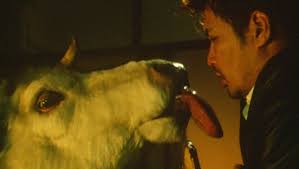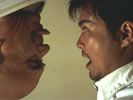Eye For Film >> Movies >> Gozu (2003) Film Review
Gozu
Reviewed by: Jennie Kermode

Gozu, crudely translated as 'cow-head', is ostensibly a film about one gangster searching for another (whom he may betray, or may be in love with) in the outskirts of Nagoya; it comes across like a Japanese version of Performance, with all that studied oddity, sexual mutability, and narrative uncertainty.
Takashi Miike has made a name for himself as one of the most innovative directors in modern Japan, and here he sometimes takes on more than he can handle, letting ideas smother story and character, but it's an absorbing experiment.

Opening with the line "Everything I am about to tell you is a joke," the film unfolds with the structural complexity Takashi explored in Audition, the audience never certain what is 'real' and what is hallucination. The borderland between these two states is itself important as the story connects with Japanese spiritualist traditions. We meet supposed mediums, women in fox-fur stoles, and a bizarre demi-god, yet the character of the film remains starkly modern.
There is an intense emphasis on the sexual, especially on the interplay between imported Western taboos and the traditional (but now largely suppressed) explicit sexual celebrations of the spring fertility festivals. Boldly, Takashi has sidelined phallic imagery to concentrate on various aspects of feminine reproductive sexuality, especially lactation. From this he derives much of his trademark crude humour, but the female characters are never diminished by it. His unrelenting camera draws viewers in to the complex psychology of his virginal hero, at once attracted and repelled by the possibilities inherent in sexual contact, waiting for the remorseless supernatural to liberate him from his mundanely violent life.
In developing this story, Takashi draws on performances from a host of his regular actors, all of whom turn in solid performances and contribute to background humour. But it is only really Hideki Sone, as the young hero Minami, who really succeeds in engaging the audience.
A certain necessary coldness elsewhere means that the early stages of the film drag, and it's an hour or so before the story really begins to grip. This is unfortunate, especially considering the warm, appealing characterisation which contributed so much to the director's earlier work. It is compounded by the heavy use of cliched images, especially in the film's closing scenes, though, to be fair, some of these have been borrowed from the art world rather than film. There's a reason for all of them - this is a heavily referential film, but every reference is substantiated by a joke, often at the expense of other surrealist directors such as David Lynch (watch out for the red beans) - however, audience members unable to access this erudite humour may reasonably become frustrated.
Some will find the visceral intensity of the film simply too much - more than one person walked out of the showing I attended - though others will enjoy the gore for its own sake. Though many of the visuals are grotesque or simply drab, they are all exquisitely composed, with real attention to detail. Likewise, there is a lot of hidden detail in the script - Gozu demands a lot of attention throughout, which is unfortunate, because it's not always very good at holding it.
Gozu is by no means on a par with Takashi Miike's best work, yet it deserves some credit for demonstrating that this is a director determined to keep exploring new things rather than playing it safe. It is very far from being a safe film, and is a brave attempt to reconcile some of modern Japan's sexual neuroses, but those who go to see it will need to be brave too.
Reviewed on: 11 Jul 2007

















